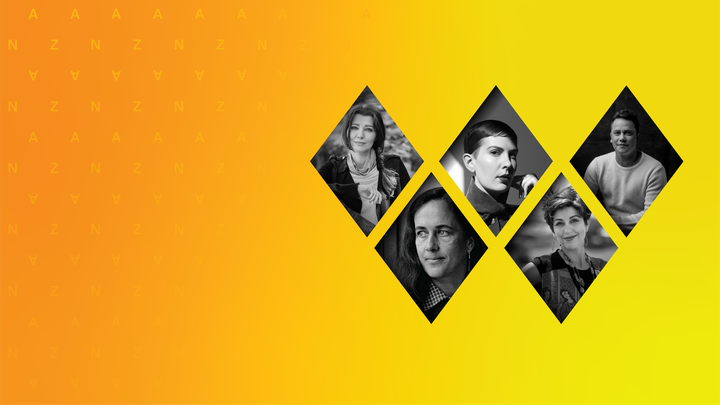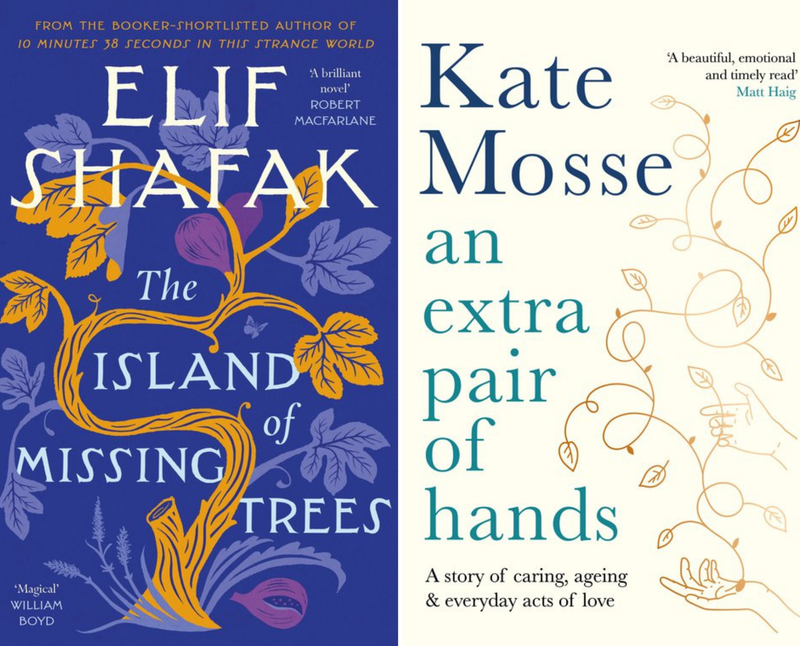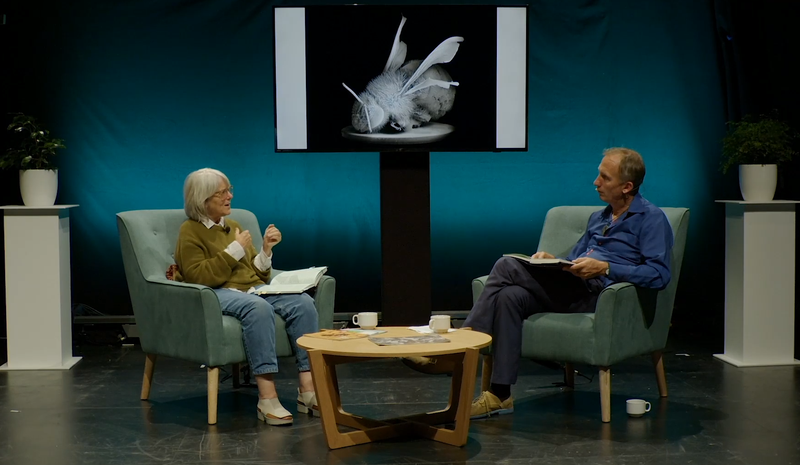25 March 2022
A Series of Snippets from our Digital Writers Programme
The Writers programme is one of the core parts of the Aotearoa New Zealand Festival of the Arts, and this year we are thrilled to be able to present over thirty talks online. We've selected a few of our favourite snippets from the talks to help guide you into the programme.
All talks are available online until Sunday 3 April, 2022.

On Storytelling:
Patricia Lockwood: There are things in this book that I wouldn’t want people to think about me or about my own thoughts or about my own behaviour, but you have to be willing to let the protagonist have those things. You have to let her be worse than you.
Mariana Mazzucato: There’s an old Native American and Platonic saying that storytellers rule the world. And you know, a lot of this is about changing the stories of where value comes from.
Sarah Krasnostein: We need to clear space for the messiness of factual writing, which is the messiness of life at the end of the day.
Clementine Ford: There’s nothing more courageous than opening up the crack of your ribs and showing people what’s inside.
N.K. Jemisin: I don’t really care if readers know how I got there. My job is to sell it to them. Whether it makes sense, or not... We writers are wonderful liars. That is the core of what we do, is we’re good liars.
Kirsten McDougall: A lot of writers who write about craft will say the same; that story structure is so deeply embedded in all our bodies. A child can tell you about story structure: beginning, middle and end, you know? And so, you’ve kind of got to deliver really. Lots of people would argue against it. And maybe that makes me a really unliterary writer because I don’t. I don’t care, actually.
Whiti Hereaka: I thought about art classes in high school. So we were always, when we were painting in art classes, you’d paint some of the painting, and then you put it away and work on another piece while that was drying. So that’s how I kind of thought of it to myself, you’re not giving up, you’re just going and learning these other skills.
Elif Shafak: I love stories, like every storyteller, I chase stories, but I'm equally drawn to silences. So the things we cannot talk about easily in our society, there's a part of me that wants to understand why is that the case? I want to give more voice to people who have been voiceless for a whole variety of reasons. So rather than the centre, I want to focus on the periphery, and I want to try to find untold stories, silence stories, and try to make the invisible a little bit more visible, you know, and I think literature in that sense, has a very radical, transformative power. It can rehumanise people who have been systematically dehumanised by mainstream discourse.
Anna James: I love a cozy book that isn't twee, and I think that's always kind of what I'm striving for. I do think food is a key element of good children's books. I hate it when you're reading a book, and it tells you that a character had a meal, and it doesn't say what they ate. So it's like they had lunch. And it's like, what a wasted opportunity.

On Feminism:
Mariana Mazzucato: A friend of mine said, women get insulted while men just get criticized.
Kate Mosse: It’s not that women never did anything, it’s that the decision has been made that it’s not valuable enough, or a different story is to be told.
Dame Fiona Kidman: My first published novel was in 1979, and it was called A Breed of Woman. And it evoked the most furious response from people. I was thought of as quite a sort of disgusting young woman for having written so blatantly about women’s lives, so openly about women’s lives.
Clementine Ford: To be a feminist, as you know, to go out and fight that battle every day, despite the enormous amount of backlash that you get […] and the abuse and the trolling that goes with that. And that’s all personal stuff, but also like on a macro level, being a woman in the world who’s like, well I’m going to fight the patriarchy. It does require a lot of tenacity and courage. And women have those things in spades.
Emily Writes: I think those early days of the pandemic really reminded me, well continue to remind me, the lockdowns of when you first bring your baby home, and you feel like the world is passing by all around you.
Jennifer Higgie: Physicists were really interested in spiritualism. Physicists such as Marie Curie were fascinated by the idea of contacting the dead. And so, in the 19th century, a lot of women especially because they were excluded from the patriarchal art history that was being taught, they did develop a lot of these women-led groups, and they were exploring spiritualism and art alongside each other.
On Mātauranga Māori:
Arihia Latham on Nic Low’s Uprising: It’s like you are a piece of pounamu being sort of knocked about down an awa, you know, slowly roughed, and you sort of step out a little bit worse for wear, but also with a particular shine.
Ebony Waitere in 30 Years of Huia: In kohanga reo and in kura, we received those books that were lovingly prepared by teachers and parents that were translated, and then sticky tape over the book. So those were the sort of books I learnt how to read on. And at home, I had these really fancy Golden Books [...] that were in te reo Pākehā, and that does do something in terms of thinking about what your value is, or what other people put value on.
Dr Rangi Mātāmua: I failed fifth form science because I hated it, I couldn’t see the connection between me and the periodic table, until I kind of got my head around the fact that actually the periodic table is whakapapa, is genealogy.
On Society:
Mariana Mazzucato: That’s also true with riding a bike. You’re not going to learn how to do it without falling off. But as soon as the civil servant falls off the bike, bang, front page of the Daily Mail.
Kate Mosse: There are now 13.2 million unpaid carers in the UK. When I wrote that book [An Extra Pair of Hands] there were 8 million. That’s the pandemic. […] but what has happened, of course, what always happens, is that the majority of people who step up to be unpaid carers are women.
N.K. Jemisin: It is kind of an ongoing problem in science fiction and fantasy, that when we do see a post-apocalypse, it takes on the same form over and over again, and it’s just a little frustrating. You know, we see people kind of worshipping old technology or, you know, kind of forming cargo cults around strange, you know, leftover objects. The assumption that primitive people are foolish or, you know, people who are technologically primitive are psychologically primitive or spiritually primitive. That assumption is white supremacy in and of itself, and it’s something that we see kind of inculcated throughout our media.

Anne Noble and Mark Amery discuss Conversātiō.
On Nature:
Elif Shafak: We human beings, we’re very arrogant, we tend to think we are superior to all other creatures, or we tend to think we are the centre of the universe. We have this weird hierarchy of animals and plants. Some of them we like, some others we don’t like, others we find insignificant.
Lynda Hallinam: We think we’re in control. If anything, COVID-19 has taught us that we’re not. You know that there are other things that are more determined to survive than we are, even. And so I think that’s the important thing about being a gardener, […] I think it brings your focus down and reminds you about the power of nature, and the fact that we’re just one cog in a very large wheel.
Nic Low: I crossed the Southern Alps more than a dozen times, trying to understand how our forebears saw the land. What did it mean to define your identity by sacred mountains, or actually see them as ancestors, turned to stone?
Anne Noble: I was learning about bees, learning how to ensure that, you know, it’s not like a pet, it’s something that you’re really privileged to have alongside you as this entirely independent living system. And you just have to understand it, to learn to be with it, and to be alongside it.
Kaya Wilson: [My mother] was struggling to cope with my transition. And, you know, she has her own things going on at the same time. And we all just brought it all to the mountain. [...] we had this very isolated hike into sort of four thousand plus metres, so there were moments of extraordinary beauty, and extraordinary physical challenge, and extraordinary emotion challenge.
Anita Sethi: Nature poets, such as Wordsworth have been writing, the Romantic poets have been writing about, they wrote about it centuries ago, can again take us beyond ourselves. I mean, anxiety is an incredibly imprisoning thing. You're imprisoned in your kind of self, and in this anxious thought, whether it be of the past or of the future. But awe connects us to something beyond that, it takes us out of ourselves. And again, these are just wonderful, underrated feelings such as joy. Going for a walk in nature, going walking can just be an incredibly joyful experience.
Explore the full Writers programme and streamed talks here.